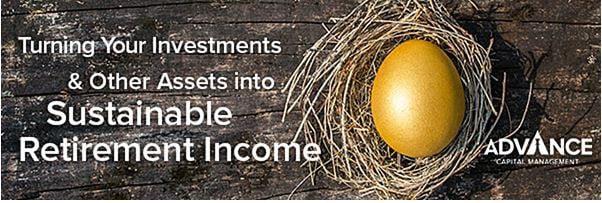Can a Retirement Income Strategy Calm Your Retirement Fears?
January 21st, 2020 | 3 min. read

We all have fears, some more common or unique than others.
If you hate to fly, then you may have aerophobia (the fear of flying). You’re like most people if you suffer from glossophobia (the fear of public speaking).
Does this – 570237570834 – get your heart racing? Then you may be an arithmophobe, someone who has a fear of numbers.
Do you cringe at the thought of walking through a damp, shady forest? Then you might have pteridophobia (the fear of ferns). Or, do you hate to go out during a full moon? It could be a case of selenphobia (the fear of the moon).
People also have their own individual fears about retirement. And, for good reason. After decades of earning a paycheck and saving money, you transition to a new unfamiliar life funded by spending your savings. Left unaddressed, however, those fears can lead to costly mistakes and can prevent you from comfortably enjoying what you’ve worked so hard to achieve.
Greater confidence comes from implementing a retirement income strategy as part of your retirement plan. According to a retirement study by Franklin Templeton, 82% with a written plan have a strategy to generate income that could last 30 years or more. If you create a plan to appropriately consume your savings based on your fears as well as your goals, retirement begins to look a lot less scary. Here are some of the most common retirement fears.
Outliving your finances
Topping nearly every retirement and financial planning survey, is the fear of running out of money. However, driving that fear are a variety of factors. In the American Institute of CPAs Personal Financial Planning Trends Survey, the primary reasons given were healthcare costs (see below), market fluctuations and unexpected expenses.
This highlights the importance of having a retirement plan you are confident in. You’ll know how you can pay for unforeseen and potentially costly circumstances. That includes adjusting your investments to reflect your need for risk and creating a well-funded emergency fund for those unexpected events.
Those steps can help you get comfortable spending in retirement. In a 2018 study published in the Journal of Personal Finance, half of retired survey respondents said they were afraid to use their savings. Being too cautious can make your retirement as uncomfortable as spending too much.
Healthcare costs
What most people fear will consume the greatest share of their retirement income is healthcare costs. A 65-year-old couple today can expect to spend $285,000 throughout retirement for their medical needs, according to Fidelity’s Health Care Cost Estimate.
Part of a retirement income strategy is allocating funds to the right needs. In fact, the same Franklin Templeton study referenced above found 86% of those with a written plan know how they will pay for medical expenses in retirement. For example, if you have known health issues, plan to set aside a specific fund for potential care. Since Medicare doesn’t cover long-term care expenses, it is a good idea to explore your coverage options, such as self-funding, an insurance policy or Medicaid.
Maintaining your current lifestyle
Everyone has their own definition of retirement, but most people say they expect to relatively maintain their current lifestyle. And, people worry that’ll become harder on a fixed income.
When preparing for this transition, it helps to implement a strategy for how you can efficiently use your assets over the long term. This includes planning around the things that can eat away at your savings, such as investment fees and taxes. Further, a flexible withdrawal rate from your retirement accounts can help you weather market fluctuations.
Social Security changes
Social Security is a primary source of income for almost all retirees. As such, there is a heightened fear over whether benefits will be changed or even the program will be eliminated. Neither scenario will likely happen any time soon, if at all. Regardless, it is something we cannot control.
What we can control is choosing the right age at which to file for Social Security. You can’t hope to live on Social Security alone. So, while there is nothing wrong with maximizing your benefit, the primary goal should be to maximize your retirement income as a whole. That may mean filing early at age 62 or waiting until age 70, depending on your situation.
It’s true, no strategy or plan will allay everyone’s fears. The sources of some fears go deeper than money. But a personalized retirement plan that addresses your current and future income needs can help you confidently realize your goals.
Worried about your retirement savings?
A good place to start is learning what it takes to build a reliable stream of income in retirement. Check out this replay of a recent webinar that'll teach you how to turn your assets into sustainable retirement income.
Advance Capital Management is a fee-only RIA serving clients across the country. The Advance Capital Team includes financial advisers, investment managers, client service professionals and more -- all dedicated to helping people pursue their financial goals.

